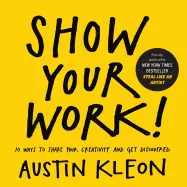
Show Your Work - by Austin Kleon
ISBN: 076117897XDate read: 2014-06-15
How strongly I recommend it: 7/10
(See my list of 360+ books, for more.)
Go to the Amazon page for details and reviews.
Short inspiring book about sharing your work online. Really healthy perspective. Makes me want to do it much more.
my notes
Consistently post bits and pieces of your work, your ideas, and what you’re learning online. Instead of wasting your time “networking”, take advantage of the network.
Many people waste time and energy trying to make connections instead of getting good at what they do, when being good at things is the only thing that earns you clout or connections.
“Scenius”: great ideas are often birthed by a group of creative individuals - artists, curators, thinkers, theorists, and other tastemakers - who make up an “ecology of talent.”
Being a valuable part of a scenius is not about how smart or talented you are, but about what you have to contribute - the ideas you share, the quality of the connections you make, and the conversations you start.
Stop asking what others can do for us, and start asking what we can do for others.
The amateur - the enthusiast has the advantage over the professional. Because they have little to lose, amateurs are willing to try anything and share the results.
You can move from mediocre to good in increments. The real gap is between doing nothing and doing something.
Authors of good nonfiction books pay far closer attention and think at far more length about all sorts of different stuff than most of us have a chance to in our daily lives. Regular people who get obsessed by something and spend a ton of time thinking out loud about it.
Two schoolboys can solve difficulties in their work for one another better than the master can. The fellow-pupil can help more than the master because he knows less. The difficulty we want him to explain is one he has recently met. The expert met it so long ago he has forgotten.
“I saw the Sex Pistols. They were terrible. . . . I wanted to get up and be terrible with them.” Raw enthusiasm is contagious.
Learning in front of others.
If your work isn’t online, it doesn’t exist.
There’s the artwork, the finished piece, and there’s the art work, all the day-to-day stuff that goes on behind the scenes.
Human beings are interested in other human beings and what other human beings do. People really do want to see how the sausage gets made. Scoop up the scraps and the residue of your process and shape them into some interesting bit of media that you can share.
Become a documentarian of what you do.
Don’t show your lunch or your latte; show your work.
Don’t share absolutely everything. Put something out there because you think it might be helpful or entertaining.
Flow is the feed. Stock is the durable stuff. Maintain your flow while working on your stock in the background.
Your influences are all worth sharing because they clue people in to who you are and what you do - sometimes even more than your own work.
“Do what you do best and link to the rest.” - Jeff Jarvis
Don’t share things you can’t properly credit.
First, they went out to thrift stores, flea markets, and yard sales and bought a bunch of “insignificant” objects for an average of $1.25 an object. Then, they hired a bunch of writers, both famous and not-so-famous, to invent a story “that attributed significance” to each object. Finally, they listed each object on eBay, using the invented stories as the object’s description, and whatever they had originally paid for the object as the auction’s starting price. By the end of the experiment, they had sold $128.74 worth of trinkets for $3,612.51. Significant Objects: Joshua Glenn and Rob Walker
The first act is the past, the second act is the present, and the third act is the future. The first act is where you’ve been - what you want, how you came to want it, and what you’ve done so far to get it. The second act is where you are now in your work and how you’ve worked hard and used up most of your resources. The third act is where you’re going, and how exactly the person you’re pitching can help you get there.
If, after hanging out with someone you feel worn out and depleted, that person is a vampire. If, after hanging out with someone you still feel full of energy, that person is not a vampire. (You can apply it to jobs, hobbies, places, etc.)
The most valuable skill he picked up in art school was learning how to take a punch.
Compulsive avoidance of embarrassment is a form of suicide.
At some point, you have to switch from saying “yes” a lot to saying “no” a lot.
“The biggest problem of success is that the world conspires to stop you doing the thing that you do, because you are successful. I looked up and realised that I had become someone who professionally replied to email, and who wrote as a hobby.” - Neil Gaiman
Joni Mitchell says that whatever she feels is the weak link in her last project gives her inspiration for the next.
“The minute you stop wanting something you get it.” - Andy Warhol
“Anyone who isn’t embarrassed of who they were last year probably isn’t learning enough.” - Alain de Botton
“The Internet is a copy machine.” - Kevin Kelly
“We don’t make movies to make money, we make money to make more movies.” - Walt Disney